- The Beatles and Jeffrey Epstein - July 24, 2020
- Emitt Rhodes, 1950-2020 - July 21, 2020
- Suggestions for a newbie? - May 21, 2020

In the midst of commenting on Michael B.’s excellent post, I was reminded of something that I’ve said to friends innumerable times but might never have ever written here for you all. I have a lot of Beatle Thoughts like that, sorry. The only solution is for everyone to live with me, and that won’t work because my cat Max gets hemorrhoids around new people.
All John Lennon needed to be happy was to give it all away.
This isn’t the hippie pipe-dream it might seem. Let me explain: At his death, the Chief Beatle was estimated to have an estate of $150 million. Say he’d given away 99% to various charities; he’d be left with $1.5 million, and you could’ve lived very well on that in 1980, even in New York City. (Treasuries were earning 11%.) He wouldn’t have been able to live in The Dakota, sure, but that place is the real-estate equivalent of an expensive watch; it looks like hell to heat, and there are supposedly ghosts. I’m guessing, but a nice (preferably ghost-free, or even minorly haunted) condo on Bank Street in the Village would’ve run Lennon $150,000. Certainly he could’ve bought a nice place in a safe neighborhood and still had a cool million in the bank for a rainy day.
Think about it: In six weeks, he would’ve known—for sure—whether Yoko only loved him for his money. And any friends that stayed, from Paul to Harry to Elton to the guy at the drugstore, were the real deal.
A “broke” John Lennon would’ve no longer been a target for scammers, pushers and users. He would’ve probably eaten like a normal person again, went to normal doctors, and stopped obsessing over nonsense like the Spear of Destiny. There’d be no security necessary; nobody would kidnap Sean. And he would’ve distanced himself for good from all his supposed competitors in the music business—like Dylan, for example, or Mick or even Paul. In 1980, Lennon seems determined to show that those guys were simply entertainers, while he was something more; this would’ve been probably the only way to show that. With a stroke of the pen, Lennon would have given his political views an unassailable moral power.
If Lennon had liquidated, he still would’ve been able to do the things that he apparently liked to do (read, cook, go to cafes, make new songs), but without nearly so much hassle. He still could’ve traveled, he still could’ve stayed in nice hotels; he just wouldn’t be indulging in the corrosive fantasy of being better than the rest of us. And because he’d once again be living like a normal person, with normal person thoughts and problems, the well of creativity that had been draining since 1963 would’ve refilled; a “broke” John Lennon would’ve been able to write songs that normal people could relate to, because he’d have turned himself back into normal people. (Yes, I know he found “normal” boring, but that was his illness talking. You know what’s genuinely boring? Entirely white rooms. Closets full of shoes and briefcases. Someone talking about macrobiotics.)
If he’d simply given his money away, John Lennon would’ve never paid for anything ever again. He’d have eaten for free, stayed in rich people’s apartments for free, and gotten free medical care when he needed it, thanks to his millions and millions of fans, made even more devoted by his generosity and ability to walk the walk. Ironically, by leaving first-class for coach, he would’ve become something very very special, something like what the Dalai Lama is today. His actions would’ve sent a powerful message to literally every person in the West: you are not your bank account.
And it’s not like the things John used to make money would disappear. He still had the rights to his work; and most importantly, he could still write and perform. If he had given away his money, then made an album and gone on tour, I suspect that would’ve been…quite the profitable venture.
In fact, I think the only way John would’ve been able to get to where he seemed to want to go—to become bigger than The Beatles, to be known as a songwriter/entertainer, but much more than that—would’ve been some game-upending gesture like this. He wanted to reap the benefits from capitalism, patriarchy, and Western religion even as he transcended them, and that simply cannot work. Lennon wasn’t a hypocrite for both craving the security of wealth and being smart enough to see that the security is illusory; he was merely a product of our society. But there is no shortcut to growth, and whether he admitted it publicly or not, he knew that his money was shackling his spirit to fear and nonsense, and it the weight got heavier the richer he became.
Sadly, a “broke” Lennon never would’ve happened; he was unable to realize his true sources of wealth far outweighed all the ink-spattered linen in his bank account. To him, even in 1980, success really was measured in money, and until that idea died, he couldn’t give it away without destroying all he’d accomplished. For all his gestures in other directions, Lennon definitely bought into the patriarchal idea of hierarchies based on wealth. Sadly, he seemed to be getting more attached to wealth and privilege as he aged; not surprising, as infirmity makes cowards of most. In the midst of all his pontification in the 1980 interviews, “I’ve got mine” is a constant, sour note. He seemed to resent, rather bitterly, anyone who suggested that maybe he didn’t need so much, or that he might, for example, do a free concert.
But giving it all away would’ve been better for him. His generosity would’ve been the most self-benefitting thing he could’ve done. Great wealth simply wasn’t worthy of the guy; getting rich was the least of what he did. There are bond traders that are much richer than John Lennon ever was.
As billionaires and billionaire-ism occupies much of our political talk today, I am struck once again: if John Lennon had really wanted freedom, respect, and abundance, all he had to do was give his fortune away.

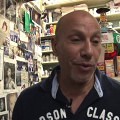
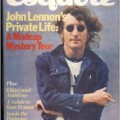

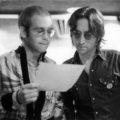
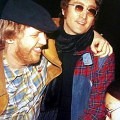
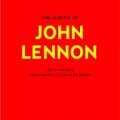


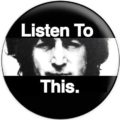

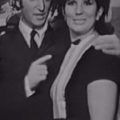
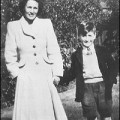
Great post. John Lennon with “only” 1.5m is a fascinating thought experiment. Ironically, I think we have some evidence that this would have worked out well, because if memory serves, during the Lost Weekend, his money was tied up between Klein litigation and Yoko’s demands, so he had to live somewhat more frugally. And he was more than fine: after he and May moved back to New York, he actually lived the most stable life bed probably known since Uncle George was alive.
Between Mimi and Yoko, John didn’t have good role models for the idea that money does not equal worth, or that being upper class is not an achievement. When he was around these ideas, they got to him quickly and were a bad match with the part of Lennon’s personality that used “genius” the way someone else might say “CEO” or “billionaire” or “Duke.”
I think you’re absolutely right that in 1980, John was particularly concerned about proving he was more than another songwriter/entertainer. I see this as being a combination of insecurity about making a comeback, insecurity about the well being dry, ongoing jealousy of/competition with Paul, and insecurity stemming from Yoko’s belief that being the founder of the Beatles was significantly less valuable than being an Artist. Add John’s narcissism and megalomania (you don’t create the Beatles without some of each) and you have Lennon circa 1980. As you say, there were many things he could have done to be bigger than the Beatles if that was his goal. I increasingly think that those around Lennon knew that was his goal and gave him bad advice in those months.
Michael, are you saying John could have been broke AND woke?
Haha! Good one Justin!
LOL — I’m saying the only way that guy could’ve ever been truly woke was if he were truly broke.
I find that photo of the floor-to-ceiling file cabinets rather crushing. Whether or not that room is actually windowless, it sure gives off a bunker vibe to me. I can’t imagine wanting to spend five minutes there, let alone the many hours a day there that Ono evidently did.
.
And to the point that Michael B. raised in his recent post, what exactly was Yoko Ono doing during this period that required her to be on the phone so many hours a day? The business of making money seems to have taken up a lot of space, both physical and mental/emotional, in this household in the 1970s.
.
Reading about Lennon in the 1970s gives me the sense that his fatigue comes primarily from the kind of cognitive dissonance you get at in this post, Michael. Money isn’t making him happy. At some level he knows his creativity is stifled and he’s cut off from a lot of people who care about him. But getting to the point where he could act on that — that would have taken either good therapy or more time than he ended up having. Just at the simplest level, changing anything major would have meant working out details with Ono. And she was clearly dealing with her own past trauma, which importantly included poverty and deprivation. With more time, I think something would have had to give, and that something could well have involved money and living arrangements.
I agree Nancy. And what could possibly be in all those file cabinets? If only we could find out, many questions on this blog would surely be answered.
I mean, I’m keeping in mind that it was the analog age and people needed to keep more paper records, but that wall of file cabinets seems truly bonkers. It feels like a statement that What Goes On In Here Is Really Important. That photo makes the whole Yoko downstairs doing business on the phone vs. John in his bedroom upstairs watching TV newly vivid to me.
My guess is this was the beginning of the Estate’s buying the rights to every photo that they could. Although it simply could be contracts. By 1979 or whenever, the amount of paper generated would’ve been intense; back when I had 25 editions going of my books, just that was a full filing cabinet.
Clearly I’m thinking about this photo a lot! Whatever’s in those cabinets, it was a choice to keep it all in the Dakota — and that is interesting to me. Obviously they could have afforded to keep all that paperwork elsewhere (or, more likely, to pay attorneys/CPAs etc. to keep it elsewhere). Why live with it all, day in and day out? Why did Yoko Ono evidently decide to spend so much time on this rather than on doing art?
.
I find the Lennon/Ono Dakota years perplexing, and this image brought that into sharp focus for me. The decision to dive so deeply into “business” and to bring it all home seems odd, and I think related to your point about the burden of their having so much money to manage.
Control. Controlcontrolcontrol. Managing that amount of money (or any amount of money) doesn’t have to be a burden if you pick good, trustworthy people who act as a check on each other. Your accountant checking your business manager, your lawyers checking both. $150 million can buy a lot of good help. Unless you were born wealthy and then lost it all, in which case you must do it all yourself and trust no one. THAT is very stressful. (OTOH, it’s worked in Yoko’s case, unlike in poor George’s.)
.
The Lennons had (and surely Yoko has) a legion of CPAs and lawyers on retainer. I don’t think it’s crazy to have copies of all your contracts in your home office, but my guess is that these filing cabinets held a bunch of other stuff: contracts and other business papers, sure, but also personal correspondence, tapes, maybe even memorabilia — anything that could be kept.
I’ve realized that I’ve responded to this photo as I have because if I had millions of dollars I would be ecstatic to outsource a whole bunch of this kind of work to trustworthy people. When my husband and I decided it made sense to have a CPA do our taxes I was thrilled.
.
The Lennon/Ono Dakota years do seem to be about control — and about suspicion as well. Points to Yoko for managing and overseeing all those interests and all that money as well as she has. I sincerely hope she’s enjoyed doing it. Being in a room with that number of filing cabinets and having to deal with all that monetary information would be, for me, a straight-up nightmare. Perhaps that is part of the reason I don’t have millions to manage!
.
And you’re probably right about all kinds of other things being in those cabinets. As a person who cleaned out my parent’s overstuffed house a few years back, all I can say is ACK. Lennon and Ono had the space to keep a lot.
.
Reminds me of what Elton John said about the Lennon/Ono penchant for acquisition:
.
“John and Yoko were as bad as me when it came to shopping. The various apartments they owned in the Dakota [in New York City] were so full of priceless artworks, antiques and clothes that I once sent them a card, rewriting the lyrics to ‘Imagine’: ‘Imagine six apartments, it isn’t hard to do, one is full of fur coats, another’s full of shoes.’”
Link to source
.
Good question. It’s so obsessive. Almost an addiction.
.
Here’s some of an interview with Ronnie Hawkins (courtesy of Karen Hooper)
.
Q: What were your first impressions when you met John?
A: Well, I didn’t know too much. I did know that Yoko was super intelligent. She was supposedly be able to speak five or six or seven languages. I know she could call anyone. She put 16 lines in my house and she could pick up and phone the ambassador to Japan, Princess Elizabeth, Peter Sellers. All those people, she just picked up and talked to everyday.
Q: Literally 16 telephone lines?
A: Yeah. they negotiated on a Saturday night, and daylight Sunday morning 16 lines came across the fields into my house. Usually, you have to wait six months for one phone, but this is what happens when you have authority… And to top it off, the phone bill was never paid.
https://beatlequotes.wordpress.com/2020/02/16/that-time-in-mississauga/
That’s fascinating, Sam. It’s like Yoko Ono trying to build the internet before it existed!
Mr. Gerber made some good points last year about John (and Yoko’s) insecurities about finances:
.
He was growing older, and richer, and for all his admirable political stances, remained staunchly (almost defiantly) capitalist until the day he died. In fact, he was quite peevish in those late interviews when it was suggested that there was a dissonance between his politics and his personal conduct. Unlike many rock stars, John didn’t even want to perform for free, no matter the cause.
.
From what we know of his and Yoko’s financial activities in the Dakota period, they were acting aggressively to protect their fortune, buying things like real estate and dairy cows as hedges against inflation. Lennon was very interested in staying rich, and Yoko certainly had a competitive thing going with Paul, money-wise, which has persisted over the years.
.
I wonder if giving it all away (or most of it) would have precipitated a massive anxiety attack. Certainly in Yoko, with her traumatic history of childhood deprivation. And probably in Lennon, who saw money as a protective cloak. If Lennon had suggested such a thing (“Yoko! Imagine no possessions! No, I’m serious, hear me out!”) Yoko possibly would have taken steps to have him declared mentally incompetent.
.
.
I believe Paul, Harry, Elton and the drugstore guy would have stuck around. Yoko? I honestly can’t say.
.
Here’s the thing with Lennon giving it all away: he’d have to make a habit of it. Because he was like one of their dairy cows. He was a milk producer. He might have had fears about his creativity running dry, but he could always bang out enough tunes for an album or two, and David Geffen or someone would have been happy to promote it. Even if the record-buying public eventually decided his solo work wasn’t worth paying for anymore, there was still the Beatles back catalog to repackage for new generations of fans who might not be interested in his Jack Douglas offerings.
I don’t know, of course. All I know is what I’ve read in books, magazines, whatever. His last years he was holed up in the bedroom of the Dakota. Reading, watching TV, the wheels and smoking weed . In those years he was occasionally writing music or playing oldies on guitar, piano. From the outside, those of us, old Lennon fans, he appeared more or less stagnant. Reading about those years after he was gone, II recall not being surprised to learn how little he was actually doing.
I do not know how others feel about him, but to me, I just think, as an artist, he seemed to be dull and boring himself silly. As an artist, I must be doing art things or I become unhappy. Beatle John had nagging Paul bugging him to get to work. Now that was gone. Yoko didn’t want Paul around. Surely a wee visit was okay but no more.
John hadn’t really spoken to him in years. So my guess is, despite the JohnYoko spin John wasn’t happy those years. After all, he wasn’t really Daddy cook 24/7. There were nannies, cooks.
As far as the real subject here, John throwing away his money? Nope. Don’t think so. Yoko was doing the money business. She would never have allowed it.
And yes, I feel John was too dependent on Yoko. After all, Yoko replaced him soon after he was gone.
Homebody John is a sad figure to me. Sure he was digging up old demos, recording them and releasing them for the public, but DF was not well received before John was murdered. I think those former employees told the truth for the most part about John.
I confess Beatle John, the working artist, was a more interesting person tome. More fun, better music. All this is just my opinion of course.
This is only the second thing I’ve read about this about John in his later years and no charitable giving. From all books and a person who claimed to have researched spirit foundation, compared to the other solo Beatles, john and yoko did far less if any charitable giving, though he did do 2 or three benefits concerts in the beginning. Someone noted that researched the spirit foundation and traced any monies and could never find on record where any money donated to, so that could have been set up as a tax break, I’m not sure. I have never researched John and yoko charitable givings but do know that never once read stories about them, as did about the other solo Beatles, giving to individual folks in financial need along or to charities and, if they did, what charities John and yoko gave to. The foundations or Liverpool music school have been researched and found to be charitable though Liverpool school nice got some government subsidy. George gave freely to Hare Krishnas.
I do know that when in mid seventies, Paul was then declared richest celeb because of father-in-laws wise advice to invest in song rights and that supposedly John directed yoko to build up their wealth. I always noticed a curious lack of information about this with John and yoko so I assumed they didn’t give. I agree that this would have given his life and his message much more meaning and probably would have inspired him artistically. Kudos for bringing up a hardly ever discussed subject.